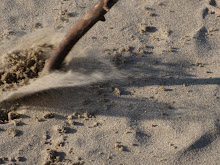Ahlam Ahmed Mahmoud al Al-Jabouri and Beth Ann Toupin, co-founders of the Iraqi Mutual Aid Society Chicago, were at Jeremy Deller's It is what it is exhibit talking about Iraq, refugees going first to Syria then to Chicago. We talked about their work helping settle refugees who know little of our culture, even if they know the language, which about half do by their estimates. They said that most of our culture they pick up from prime-time TV, so when Ahlam's relatives knew she was in Chicago, they asked if there are a lot of gangs around.
They both explained that when they arrive in Syria, where most of the refugees are because their border remains open to refugees headed to the UN camps, they put their names on the list and about a quarter of them get resettled, with many coming to Chicago, settling in Rodgers Park and Edgewater. They get one month's rent, a bed (cot) per person, a blanket, a fork, a knife, a plate and a piece of furniture for the living room (can be a plastic chair). They get a little money, much of which goes to rent deposit and some overhead for the agency that settles them and buys the items. The Iraqi Mutual Aid Society tries to cook them a meal when they first arrive, and get them donated items they might need like winter coats or sofas etc....
They estimated that 17,000 refugees arrive per year, and about 1400 arrive in Chicago. There are 2,000,000 refugees in Syria. As of yet, their group has no funding, just volunteers, and a donated space to store furniture and clothes. Ahlam said that in Rodgers Park and Edgewater there are about 5 or 6 Iraqi families in a single block. Beth said that adapting to the culture is challenging. One of the first things they tell them is not to bribe the police. If you get stopped for a traffic violation in Iraq, the first thing you do is reach for your wallet, so the police know that you will pay them. Not such a good idea in Chicago. But Ahlam said that the police have really helped her twice already. The first night she was here, she went out to get an item at the store, and couldn't find her way home. She flagged down a cop who drove her around the neighborhood till she recognized where she was at.
Beth talked about how educated refugees sometimes find it harder to adjust because they might have had a great profession in Iraq, and working sweeping floors for $7 dollars an hour is such a shock to a skilled doctor or architect, for instance.
We also talked about life in Iraq. In the exhibit their is an actual car, mangled from a car bomb and burnt and rusty. There are also photos of an historic street market where people come to sell books that they may have read, and to buy books they have not read yet. There is a before picture, a bombed picture - where one cannot tell that it is even a street - and a new picture of it rebuilt. Ahlam said that you have no idea when you are told that there was a car bomb, what scale that means. These things are extremely destructive. Twice, she told us, she was a block or more away. First thing is that you cannot hear, and your ears start to bleed. Then you can't smell or breath from your nose for the smoke. Then your head hurts like a migraine due to the concussive power of the bomb.
We talked about charities in Iraq and the widows. Only the small charities and NGO's are left, ones that don't need insurance. Even Amnesty International and Human Rights Watch have pulled out.
The challenge is even more acute in the countryside. Women there are stuck with their relatives and there is no aid or charity working in those areas.
Friday, October 23, 2009
10/17: Ahlam Ahmed Mahmoud al Al-Jabouri and Beth Ann Toupin
Labels:
advocacy,
global thinking,
installation,
interactive,
Iraq,
thesis,
war,
Widows
Subscribe to:
Post Comments (Atom)

No comments:
Post a Comment